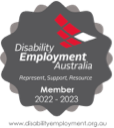Employment Opportunities for Individuals with Autism
Introduction
Autism is a spectrum disorder that affects individuals differently, often enhancing specific skills and abilities. April, recognised as Autism Awareness Month, is an opportune time to discuss the unique skill sets of individuals with autism and the benefits they bring to the workplace. To gain a deeper understanding of Autism and available supports click here
Unique Skill Sets
People with autism often possess unique skills that can be highly beneficial in various job roles. These may include:
- Attention to Detail: Many individuals with autism excel in tasks requiring precision and meticulousness.
- Strong Memory: They often have an exceptional ability to recall facts and details.
- Systematic Thinking: Their ability to understand systems and patterns can be advantageous in fields like IT and data analysis.
Benefits of Employing Individuals with Autism
Employing individuals with autism is not just about providing opportunities; it also brings tangible benefits to businesses:
- Diversity and Inclusion: It fosters a diverse and inclusive work environment.
- Unique Perspectives: It brings unique perspectives that can lead to innovative solutions.
- Reliability: Individuals with autism are often highly reliable and punctual.
Support for Individuals with Autism
Various supports are available to assist individuals with autism in the workplace:
- Job Coaches: They provide one-on-one training and support in the workplace.
- Supported Employment Programs: These programs offer assistance with job searches and interviews.
- Workplace Adjustments: Employers can adjust the work environment to help autistic individuals achieve their potential.
TURSA: Championing Employment for Individuals with Autism
TURSA, as a Job Services Provider, successfully supports employment for people living with autism. TURSA understands the unique challenges and strengths of individuals with autism and works closely with them to find suitable employment opportunities. TURSA also works closely with other community organisations, employers, and participants to ensure they have the tools, support, and modifications needed to achieve their goals.
Hiring Autistic Individuals: A Guide for Employers
So, you’ve read a little about the facts and benefits of hiring autistic people. Let’s delve into the practical steps to make this process successful. Whether your candidates are neurodiverse or not, setting them up for success is crucial.
Key Considerations
When hiring autistic or neurodiverse candidates, keep the following points in mind:
- Rethink the Interview Process: There may be better approaches than traditional interviews. Instead, focus on observing and assessing candidates based on their abilities within your organization or team. Look beyond scripted answers and consider their practical skills and potential contributions.
- Holistic People Processes: Consider the entire employee lifecycle, from hiring to onboarding. Ensure that your processes are inclusive and supportive. This includes adapting your career progression paths to accommodate diverse talents and strengths.
- Cultivate an Inclusive Culture:
-
- Respect Differences: Embrace diversity by acknowledging and respecting individual differences. Autistic individuals bring unique perspectives and skills to the table.
- Mentorship: Provide mentorship programs to support neurodivergent thinkers. Mentorship goes beyond career planning—it helps navigate workplace nuances and fosters a sense of belonging. Speak with your Job Service Provide for more information.
- Beyond Acceptance: Aim for more than mere acceptance. Create an environment where everyone feels they truly belong.
By implementing these strategies, you can contribute to a more inclusive workforce and provide equal opportunities for autistic individuals. Let’s work together to create a workplace where everyone thrives!
Remember, every workplace can make a difference by adopting these changes, many of which are low-cost or cost-free1. Let’s empower autistic individuals and celebrate their unique abilities!
Employing individuals with autism is a win-win situation. It provides opportunities for a marginalised group while bringing unique skills and perspectives to the workplace. With the proper support and understanding, individuals living with autism can thrive in the workplace.
The Workmate System
Starting a new job can be daunting for many people. A new job can present some real challenges to a new staff member. Meeting other workers, learning new tasks, procedures and the general workings of the business, all of which can seem simple to old hands, can sometimes frustrate and confuse a newcomer.
Many businesses use a Workmate System to help new employees settle in and be more productive in a shorter period of time.
A Workmate System pairs up a new employee with an experienced employee to support the induction process. In the first few weeks a seasoned staff member can help considerably to assist the new employee to feel part of your workplace and get up to speed quicker.
Manager/Supervisor time with new employees is freed up to deal with job specific issues rather than settling in a new employee.
What is Workmate?
The Workmate System matches new employees with your staff who have been with the business for some time (typically minimum of 6 – 12 months), for their first few weeks in the job.
The Workmate provides the new employee with a point of contact for general queries regarding day-to-day operational issues, such as the location of facilities, policies and staff roles. They help the new employee by providing access to someone who is familiar with the business’s culture and expectations
Who should be appointed as a Workmate?
Ideally a Workmate should be of a similar age and background and have the ability to be an ‘informal friend’.
A Workmate must be willing to take on the role and have an approachable and friendly attitude. They should be preferably someone in the same work area at the same or similar level, who is ‘around and available’ most of the time for helping the new employee.
A Workmate is not a mentor or coach. He or she is not responsible for the formal training of the new employee or held responsible for the new employee’s performance
How to appoint a Workmate
The Manager/Supervisor is responsible for appointing a Workmate prior to the new staff member’s arrival.
The appointed Workmate should understand the importance of this role and that it will last for several weeks, depending upon the new staff member’s speed in adjusting to the new workplace.
Workmate Responsibilities
- Introduce the new employee to co-workers
- Show them around the workplace
- Show the new employee where to get equipment and supplies
- Take the new employee to the tea room and make sure that they do not eat alone for the first few weeks
- Explain the operation of any equipment or systems they need in order to commence work
- Check with the new employee daily to see if they need support or have questions
Having a Workmate is a Win/Win/Win Solution
There are significant benefits to your business, the Workmate and the new employee
- Increased employee productivity
- Increased employee retention
- Enhanced employee development
- Recognition as a strong performer
- Opportunity to encourage and engage others
- Enhanced leadership and communication skills
- One-on-one assistance, Single point-of-contact
- Smoother induction
- Knowledge of “how things really get done”

Tursa Employment & Training acknowledges the traditional owners and custodians of country throughout Australia and acknowledges their continuing connection to land, water and community. We pay our respects to the people, the cultures and the elders past, present and emerging.












